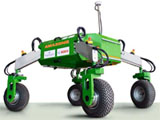Agricultural and Biological Systems Engineering, Department of

Department of Agricultural and Biological Systems Engineering: Faculty Publications
Document Type
Article
Date of this Version
2023
Citation
Heeren, D. M., Hayde, L. G., Eisenhauer, D. E., McCornick, P. G., Mohammed, A. T., Mittelstet, A. R., Boldt, A. L., Qiao, X., Mabie, D. M., & Munoz-Arriola, F. 2023. A graduate-level field course in irrigation and agricultural water management for an immersive learning experience. ASABE Annual International Meeting, Paper No. 2301165, Omaha, Nebraska, United States. 17 pages.
Abstract
Effective irrigation and agricultural water management (IAWM) is critical for food security and water security. A key requirement in designing, implementing and operation of IWM is the necessary knowledge and capacity on the farm, in the service industry and within the supply chain. Educational opportunities that not only teach the relevant principles of irrigated agriculture, but also the necessary applied skills are essential. An Irrigation Field Course was initiated by the IHE Delft Institute for Water Education (IHE Delft) and was later developed as a joint field course with IHE Delft, the University of Nebraska-Lincoln (UNL), and the Daugherty Water for Food Global Institute (DWFI). The field course was designed as a two-week course, an immersive experience. The field course was a combination of hands-on laboratory exercises (both lab and field), brief lectures to prepare students for the labs, data analysis, lab reports, and tours. Laboratory topics included surface, sprinkler, and drip irrigation systems; flow in pipelines and open channels; and irrigation well hydraulics. Tours addressed broader topics including IAWM extension programs, technology for irrigation management, manufacturing, water resources management, and impacts on ecosystems. One of the benefits of the field course is that it provides a vantage point from which a student gains a clearer systems perspective of irrigated agriculture, whether their home country is in an irrigation development phase or a water conservation phase. Students often use the data collection skills from the field course in their graduate research projects. A survey was conducted to assess which components of the course were most helpful to the students, and to compare the format of the field course to a typical semester-long course. Students indicated that the immersive two-week experience, with hands-on learning and tours providing a systems perspective, were particularly helpful (60% “strongly agree”) compared to a lecture-based irrigation course.
Included in
Agriculture Commons, Bioresource and Agricultural Engineering Commons, Educational Methods Commons


Comments
Copyright 2023, the authors. Used by permission